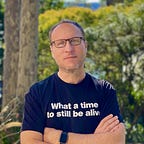To build a truly huge startup I believe you need two things; (1) unique tech intellectual property and (2) unique business model intellectual property.
But you don’t (and almost certainly won’t) build a truly huge startup on your first attempt. Yes, Mark Zuckerberg did, but Steve Jobs didn’t. Travis Kalanick didn’t. Brian Chesky did. Arash Ferdowsi did but Drew Houston didn’t. It’s possible but your odds aren’t great, and whatever the latent potential in those who did, speaking honestly they’d admit there was some luck involved, not just hard work.
If your first startup almost certainly isn’t going to be huge, why are you doing it? I think you should do it because you need to learn through experience, and you need to prove to others that you have what it takes to take advantage of the lucky break that may eventually come your way if you stick at it long enough.
If your tenth startup is going to be the truly huge startup, the other nine can be commercial failures, or they can be commercially successful.
I’d hazard a guess that you’d rather the first nine were commercially viable, at least breaking even on the time and expense of bringing them to market and exiting from them, ideally giving you a little more capital to invest in the next startup so you’re not so dependent on investment.
If you’re not a coder, your chances of hitting on a unique piece of tech intellectual property is close to zero. But you have exactly the same chance of inventing some valuable new business model intellectual property as anybody else.
All you have to do is study customers closer than anybody else. Innovative business models all arise from truly understanding the difference between what customers really want and what they’re offered by competitors.
As you say Jon, once you’ve got the great idea, there are no shortage of ways to get a minimum viable product out there to test whether your solution to a customer problem is valuable or not.
The more valuable your innovative solution, the more tolerant customers will be of shortcomings and bugs in the solution. Reid Hoffman said that if you aren’t embarrassed by your product you haven’t shipped it soon enough, but what that really means is that polished products can hide the commercial failure of a startup. A cobbled-together solution that still books revenue and retains customers is what you need to look for.
Bubble is a great solution for building a quick and dirty MVP, as is the ChilliSource stack we use at BlueChilli.
Once you’ve got a product in market, you can raise more investment for less equity if you’ve got customers and revenue. If you’re lucky, you may be able to fund further product development and growth out of revenue and not have to raise investment capital.
A coding genius is a huge asset to have in an early-stage tech startup but the absence of a coding genius shouldn’t hold you back from getting started.
You don’t need to be a coding genius to build a viable tech startup, but you do need to be a great customer researcher.
